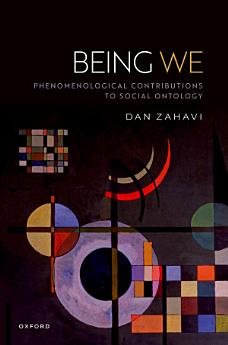Being We: Phenomenological Contributions to Social Ontology
Dec 2024 · Oxford University Press
Ebook
224
Pages
family_home
Eligible
info
reportRatings and reviews aren’t verified Learn More
About this ebook
What does it take to constitute a we with others and how does feeling, thinking, and acting as part of a we, transform one's sense of self, one's relation to others, and the way one experiences the world? Is individual subjectivity something that necessarily requires a communal grounding or does a we-relationship always presuppose a plurality of pre-existing selves? What kind of understanding of and relation to others is required if a we is to emerge? Questions regarding the ontological, epistemological, and social character of we is not only of contemporary societal relevance, but are also questions that were intensively discussed by early phenomenological philosophers such as Husserl, Reinach, Stein, Scheler, Walther, Gurwitsch, and Schutz. Drawing on and engaging with ideas and distinctions found in these historical resources, Being We combines historical scholarship and systematic theorizing. It breaks new ground by interweaving work on selfhood and first-personal experience, social cognition, and collective intentionality, offers a much-needed cross fertilization between philosophy and theoretical considerations in the social sciences (sociology, anthropology, and social psychology), and provides a novel account of the complex interrelation between we, you, and I.
About the author
Dan Zahavi is Professor of Philosophy and Director of the Center for Subjectivity Research at the University of Copenhagen. Zahavi's primary research area is phenomenology and philosophy of mind, and their intersection with empirical disciplines such as psychiatry and psychology. In addition to various scholarly works on the phenomenology of Husserl, Zahavi has mainly written on the nature of selfhood, consciousness, self-consciousness, intersubjectivity, empathy, and most recently on topics in social ontology. His work has been translated into more than 30 languages.
Rate this ebook
Tell us what you think.
Reading information
Smartphones and tablets
Install the Google Play Books app for Android and iPad/iPhone. It syncs automatically with your account and allows you to read online or offline wherever you are.
Laptops and computers
You can listen to audiobooks purchased on Google Play using your computer's web browser.
eReaders and other devices
To read on e-ink devices like Kobo eReaders, you'll need to download a file and transfer it to your device. Follow the detailed Help Center instructions to transfer the files to supported eReaders.







